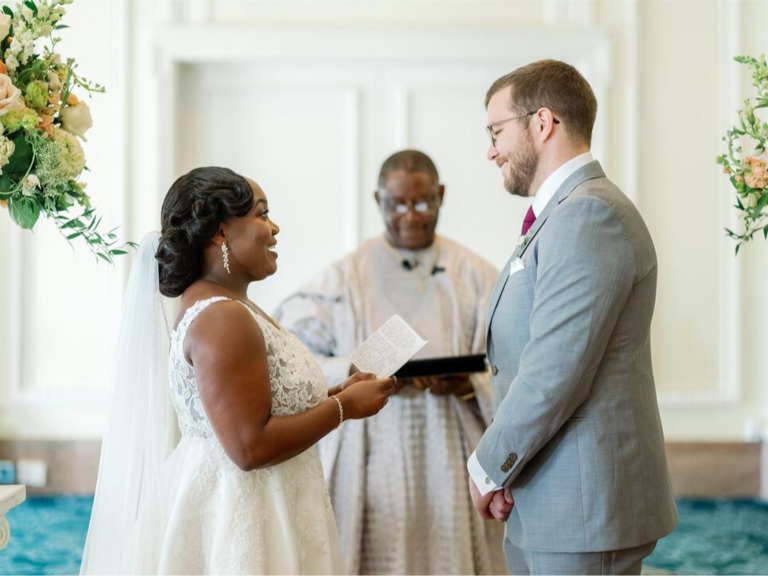How to Calm Your Wedding-Day Nerves
When you look back on the happiest times in your life—your memories will be rose-colored and sacred. But when you're in the moment, your wedding day (and especially the ceremony) may feel slightly more stressful and anxiety-inducing than what you anticipated or envisioned—and the wedding-day nerves may start to creep in. As the big celebration draws nearer, you may start to fret over the details, struggle with sleep and otherwise experience a heightened nervous system. Take a deep breath—and find comfort in our guide to managing wedding-day jitters.
In this article:
Is It Normal to Be Nervous on Your Wedding Day?
First things first, let us reassure you: wedding day nerves are beyond normal feelings for couples to experience on their big day. As Sarah Anderson, a wedding consultant at Twickenham House and Hall, explains, couples spend endless hours planning, thinking, looking forward and arranging each day's details for months (or even years).
"Once the wedding day appears, the couple can only hope their labor of love to create a day perfectly suited to their personality and desires will happen. Likewise, you may feel extra nervousness from being the sole focus of the day in front of hundreds of people and the reality of getting married. No matter what you're worrying about, though, the rollercoaster of emotions built up excitement and joyous nerves are entirely normal, Anderson adds.
How to Calm Your Nerves on Your Wedding Day
You shouldn't feel guilty for feeling anxious leading up to your wedding day—it's normal and to be expected. But if you find the stress to be overwhelming and overshadowing your excitement, it's important to find coping strategies to help you relax and be more in the moment. Here, a few ideas:
Do a first look.
Not every couple chooses to do a first look, but if you're already experiencing some anxiety, it might be the best choice for your nerves, according to Elena Gera, the owner of Focus on the Moment Photography.
"This is the time to shed tears, share laughter and exchange letters or private words, setting the perfect mood for the romantic portraits that follow," she says. "It's your only time alone with each other on your wedding day and significantly reduces nerves. While some couples may initially be hesitant, not knowing how nerve-racking the day can be, many who opt for the first look later admit feeling much more relaxed and ready for the ceremony."
Snack throughout the day.
You may lose your appetite when feeling nervous or anticipating the wedding celebration. Anderson warns that it may be tricky to stomach anything, but anxious feelings combined with an empty stomach can multiply jitters and make you nauseated throughout the day. And worst yet, it can increase your chances of fainting at the altar underneath the light and with the added pressure of all eyes being on you.
"Because a celebration is combined with caffeine and alcohol, nervous feelings mixed with these stimulants without food will only multiply an anxious person's feelings," Anderson says. "Eating little bits of food throughout the day will help calm uneasy feelings and help the marrier stay energetic to party through the night." While a big breakfast may not be in the cards, be sure to have plenty of food options available during the morning of your wedding.
And while drinking may dull your symptoms, going overboard could be a recipe for a disaster according to Cathy O'Connell, the co-founder of COJ Events. "Alcohol increases stress and raises your heart rate. There is nothing wrong with a champagne toast with your crew before the ceremony, but try to keep it to a minimum so that you are fresh and relaxed for your wedding ceremony," she says.
Review your guest list.
If you're not someone who thoroughly enjoys the spotlight, part of your nervous energy could come from being in front of people—even ones you know. And then having to make the traditional rounds at your reception could add a new layer of angst. To help with this, consider reviewing guest photos and memorizing your conversation points, suggests Vijay Goel, the COO of Catering Couture. "Make it feel more like the gathering of friends and family that it is by reviewing everyone's name and relation to your family or spouse-to-be," he says. "Be ready with that funny story or gracious thank you, and you'll find that you can see a really wonderful evening unfold."
Pad your timeline.
When planning your timeline, Gera says to add 10 to 15 minutes throughout the day to allow you to take breaks, go through meditation or any other relaxing techniques. "Typically, the wedding party takes longer to prepare than expected, and the schedule often deviates. Embrace this reality and avoid stressing about it on the day," she says.
Talk it out with your spouse-to-be.
Though you may feel ashamed of having jitters, bottling feelings and letting them fester within will multiply stress leading up to and on the wedding day. Not only will your partner understand—they love you, after all—but they may feel the same. Anderson recommends processing and venting to one another to release internal pressure.
And hey, if verbal processing is not helpful, journaling is a practical way to see and remove your thoughts from your mind. Then, you can read what you wrote out loud if you still want the feedback and guidance of your partner.
Listen to soothing music or a guided meditation during hair and makeup.
Who says you have to engage in chit-chat and gossip with your crew? It's your big day, and you make the rules. If you're feeling nervous, Gera recommends putting on headphones and relaxing with calming music or a guided meditation while getting your hair and makeup done.
"Ensure you have a planner or a friend acting as a planner who can handle various questions from the bridesmaids about where to hang their clothes or find bobby pins," she says. "Coordinating these requests is not your role on your wedding day; focus on enjoying the calming atmosphere."
Tips for Relaxing During the Wedding Ceremony
You made it through the rehearsal, the rehearsal dinner, the hair and makeup, and now it's time to walk down the aisle. You may be feeling on edge before walking through the doors and out to your partner—and that's okay. Try these calming strategies to fend off the nervous energy:
Write down your vows.
The stress and excitement of the moment can make you lose your tongue. If you didn't plan on writing down your vows, Gera suggests jotting down the sentiments you want to express, allowing you to deliver them gracefully and clearly. Then, keep a written copy tucked in your pocket. "This thoughtful preparation ensures your feelings are conveyed seamlessly, adding a touch of romance to your ceremony," she says.
Talk to your partner beforehand.
When you say 'I do', you're saying yes to a lifetime of supporting one another—for better and for worse, in good and in bad times. While this may fall under the 'good times'—the anxiety could make you feel worse. That's why it's beneficial to develop a strategy as a team, according to Sarah Chianese, the owner, planner and executive chef of Mangia and Enjoy!
She suggests talking to your partner about your nerves before the wedding day and promising one another you will each reassure one another with a little hand squeeze to let you know you are here for them as the ceremony is taking place. "While the officiant or celebrant addresses your ceremony, your nerves may keep you from being in the moment. The hand squeeze, or reassurance from your partner's touch, will ground you and bring you back to the moment," she adds.
Have your wedding parties swap sides.
Traditionally, both marriers have their family members sit, and the wedding party stands on their "side" of the altar. In other words, your people are behind you. With this arrangement, the closest people to look at other than their partner and officiant are the other wedding party members and soon-to-be in-laws. Anderson says a simple solution to easing ceremony nerves is swapping sides with your partner at the altar to see their wedding party and family supporting them. "Although the marriers find the most comfort in one another, seeing safe faces throughout the ceremony helps ease high emotions," she adds.
Embrace the unexpected.
You've heard it before, but we'll say it again: prepare for the unpredictable. By going through every last worst-case scenario in your head, you will feel less inclined to catastrophize. Gera recommends engaging in a pep talk with yourself beforehand, acknowledging that anything might happen—from an unexpected downpour to a potential wardrobe malfunction.
"It's your day, and the heart of the matter is your union. Don't let unforeseen events dampen your spirits," she says. "Embrace the unexpected with a sense of humor and resilience, ensuring that, regardless of what unfolds, your wedding day remains a celebration of love and commitment."
























